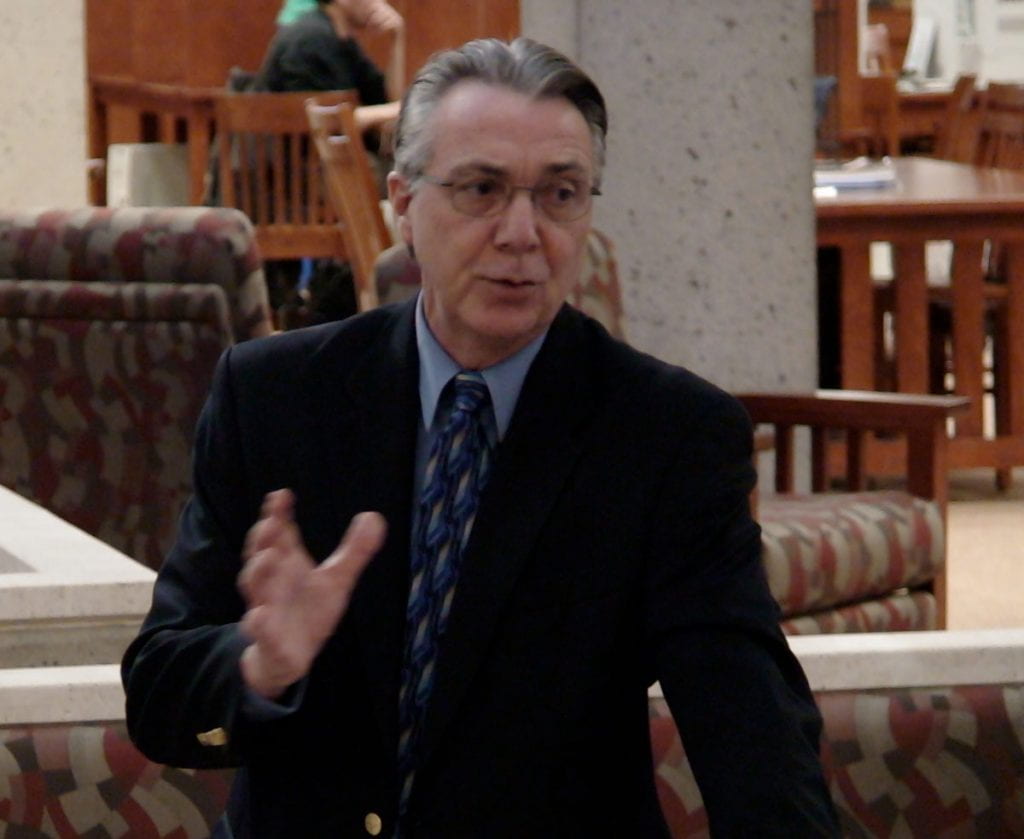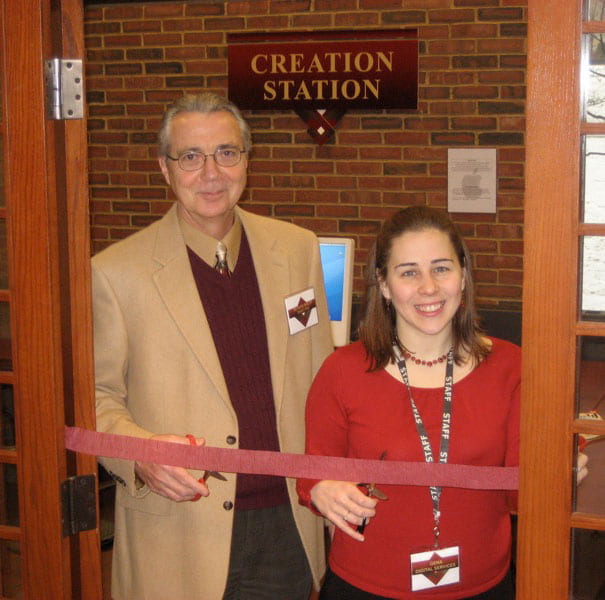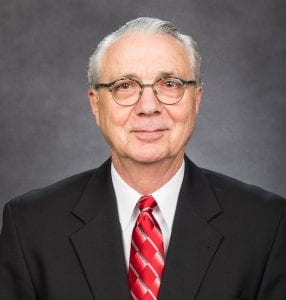In Memoriam: Dr. Donald Russell Bailey, director of Phillips Memorial Library since 2005
By Vicki-Ann Downing
Dr. Donald Russell Bailey, director of Phillips Memorial Library at Providence College for 15 years, died on Dec. 19, 2020, at Charlton Memorial Hospital in Fall River, Mass.
Dr. Bailey is credited with making PC’s library a model of the “information commons,” a one-stop shop meeting the needs of all its patrons. He was among the developers of the concept, and he wrote about it and lectured on it nationally and internationally, according to his longtime friend, Dr. George Meese, professor of rhetoric at Eckerd College in St. Petersburg, Fla.
In 2005, when Dr. Bailey interviewed for the role of library director at PC, “he told us we wanted the information commons,” said Dr. Brian J. Bartolini, associate vice president for academic affairs and chief institutional effectiveness officer. “I would say that it’s now become the way libraries envision themselves.”
As instituted by Dr. Bailey, the information commons at PC includes facilities for Integrated and Interactive Teaching, Learning, and Research; a Faculty Commons, where professors gather between classes to talk and share resources; and a Digital Commons, an online collection of the scholarship of students and faculty, academic journals, and materials from Special and Archival Collections. Under Dr. Bailey, the library also was a supportive host to all resources that enhance learning, such as the Office of Academic Services and the iHelp technology resource center.
Even renovations to the building took place with the information commons in mind, Bartolini said.
Mark J. Caprio, associate library director who worked with Dr. Bailey since 2010, said traditional libraries were organized with “hard and fast divisions” — research, periodicals, government documents, circulation — that rarely were breached. But Dr. Bailey did not believe libraries should work that way.
“Russ didn’t see any divisions along the spectrum of teaching, learning, and research. He thought they were all connected,” Caprio said. “He believed collective expertise is important to provide seamless service, and he was a strong proponent of providing that seamless service. He wanted everybody to participate in providing the resource and solving the problem.
“We educate and we support scholarship and learning as a group, not as an individual, a division, or a department. As an entire community, we take our students through the education process and prepare them for life,” Caprio said.

To that end, Dr. Bailey made sure staff members were trained so they could serve in multiple roles, Bartolini said.
“His legacy is his hiring — he hired tremendous people,” Bartolini said. “He wanted people who could be commons people and assist patrons in all kinds of ways. Even though employees had specialized areas and functions, they were not restricted to them. Cross-training was pervasive. All position descriptions were redone. It was a conceptual, strategic shift in terms of space, people, collections philosophy, and service philosophy.”
“Dr. Bailey empowered and encouraged us to go above and beyond our roles as librarians so we could better serve the PC community and further the library’s mission,” said Sarah A. Edmonds, assistant library director. “He was a champion of our efforts to make connections across campus and within our professional communities, and he supported us in the development of our careers.”
Dr. Bailey liked to say that there were several levels of scholarship at a college — the senior scholars and junior scholars who were the faculty, and the novice scholars who were the students.
“For him, the commons was about sharing a space for which everyone is responsible,” Caprio said. “Not just a physical space, but an intellectual space, an emotional space, a spiritual space.”

In addition to his library work, Dr. Bailey was a German scholar, a professor and a researcher in international education methods, and an accomplished bluegrass musician. He was awarded a Ph.D. in 1981 from Louisiana State University in Germanic studies, with a doctoral minor in library science, and held three master’s degrees.
From 1989-1996, as an assistant professor of secondary and comparative education at Eckerd College, Dr. Bailey worked with Meese on a faculty project to bring a “world heritage” emphasis to the college’s traditional Western heritage core curriculum. His mastery of languages helped the college expand its offerings in Chinese and Japanese so students would be prepared for study and work in Asia, Meese said.
He was among the delegates to the first meeting of the ASIANetwork, a consortium founded by Eckerd and six other schools that grew to more than 130 liberal arts colleges.
After leaving Eckerd College in 1996, Dr. Bailey worked as associate library director at Southwest Florida University, Green Mountain College, and the University of North Carolina, Charlotte, before coming to PC. He was an associate professor at the time of his hiring and was promoted to professor in July 2016.
Because his language skills were so cosmopolitan, Meese said, Dr. Bailey might reply to Facebook posts in French, German, Korean, Czech, or Icelandic, in whichever language the recipient was most comfortable. He received Fulbright awards for scholarly research in Germany, Korea, and Japan.
From childhood, Dr. Bailey loved music. He was a bluegrass musician with two albums of original compositions, Tossed Ballads and 2nd Chants (in English, German, French, and Cherokee).
“He was such an eclectic person. Such a keen intellect. So creative. His ballads were jazzy, folksy, offbeat, just like him,” Caprio said. “He had that creative spirit. He loved intellectual calisthenics. Sometimes I couldn’t understand a thing he would say to me. He would write with parenthesis, arrows, odds formations of words. He was quite an amazing individual.”
“When you are intellectually restless, what better place to be than in a library,” Caprio added. “You get to ride in the sidecar of all the disciplinary specialists on projects and research, and to learn about their expertise.”

Dr. Bailey was deeply affected by the death of his wife, Molly Kayes Ransbury, in May 2019. They were intellectual companions and world travelers. After months of grieving, Dr. Bailey had begun to compose and play guitar again, and through Zoom video conferencing, found fellow folk players and singers in the region who met regularly to share and discuss their music.
“He was starting to reach out and embrace the world again,” Caprio said. “And, of course, COVID didn’t help, and he had to do all of it from the confines of his home.”
Hours after joining his library colleagues for a virtual Christmas party, Dr. Bailey suffered a medical event during an appointment at his physician’s office. He died the following day.
Dr. Bailey was born in rural Nashville, Ga., and graduated from high school in Orlando, Fla. He received a bachelor’s degree in German from Florida Presbyterian College in 1968. He was awarded a master of arts degree in Germanic language and literature from the University of Kentucky in 1970; a master of education in curriculum and instruction from LSU in 1987; and a master’s degree in library science from the University of South Florida in 1995.
Dr. Bailey was the keynote speaker at conferences on information commons, learning commons, and faculty teaching and research commons at more than 16 national and international meetings, including Rome, Hong Kong, Glasgow, Prague, Budapest, and Montreal. He co-wrote Transforming Library Service through Information Commons: Case Studies for the Digital Age (Chicago: American Library Association, 2008), and wrote more than 30 peer-reviewed articles on digital information, learning, and scholarship.
He was an executive board member of the Higher Education Library Information Network, HELIN, for 15 years. He served four professional journals as reviewer.
Dr. Bailey is survived by a sister, Vivian LaVerne Bourn, of Monroe, N.C., and a brother-in-law and sister-in-law, Michael and Elizabeth Ransbury, of Fredonia, N.Y. His brother, Hardy Wesley Bailey, Jr., died in 2013.
Funeral arrangements were by Family’s Choice Cremation in Warren, R.I.






